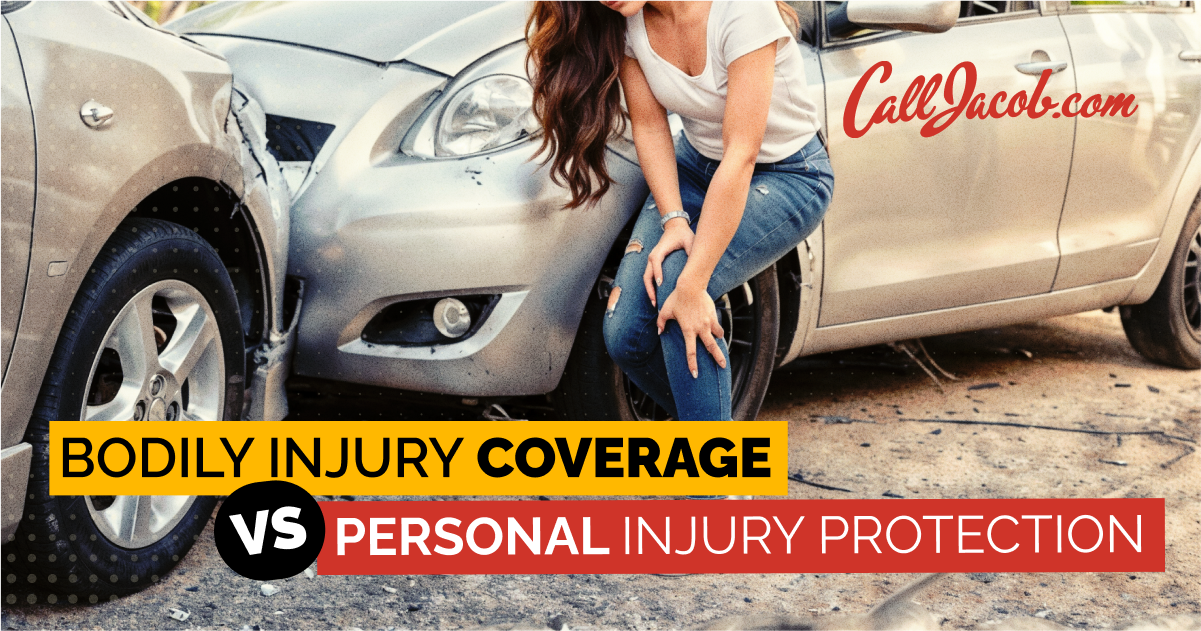If you’ve been in an automobile or other accident, you may wonder about the difference between bodily injury coverage and personal injury protection. These terms refer to different types of insurance coverage. However, both pay for medical bills and related expenses that result from an accident; regardless of which applies, the insurer typically does not send the plaintiff a check for medical bills (more on how this works later).
Here’s a clear definition of the two types of coverage:
- Bodily Injury Coverage: Covers physical injuries to other drivers, passengers, and pedestrians when the insured is at least partially at fault for the accident. It does not pay for your injury or death but protects against lawsuits filed against you.
- Personal Injury Protection (PIP): Whether you caused the accident or not, PIP pays medical and funeral expenses for the insured, their passengers, and any pedestrians hit. While California requires drivers to have bodily injury coverage, PIP (or MedPay coverage) is not required.
Aside from these key differences, the way insurance companies pay a claim is very similar. Generally, PIP coverage pays for medical bills in a no-fault state. If a driver has medical payments coverage, it can pay for smaller expenses, so once the reimbursement amount hits the policy’s limits, you can reach out to the at-fault driver’s insurance company or file an uninsured motorist coverage claim on your policy.
However, California is an at-fault state. The at-fault driver’s bodily injury coverage should reimburse your health insurance provider. If they’re uninsured or underinsured, you can file a claim on your policy and be reimbursed for any remaining accident-related expenses.
How Much Bodily Injury Coverage Do I Need?
In California, drivers must carry a minimum liability insurance of $15,000 for an injury or death to one person and $30,000 for the injury or death of two or more people. The California Insurance Code also requires policyholders to have at least $5,000 in property damage coverage.¹
Will I Get a Check for Accident-Related Medical Expenses?
The cost of medical care following a car accident can easily be in the tens of thousands of dollars. But even if the insurance company covers these costs, you’re not likely to see a check. Here’s how the process works, whether bodily injury coverage or personal injury protection coverage applies to your claim:
- Your health insurance company covers the cost of medical care.
- The car insurance provider processes your bodily injury liability claim.
- The car insurance company reimburses the health insurance provider.
Injury claims are often processed slowly. That’s because an insurance company doesn’t know the full amount to pay until your medical treatment is completed. Also, many injuries take time to heal, so the full value of a claim isn’t known until the insured (or another injured party) reaches maximum medical improvement.
However, insurance companies expect to be reimbursed fairly quickly (even after you pay the required deductibles and copays). Since it can take months or years for a case to settle, waiting can result in exceeding the insurer’s deadline. This can negatively affect your credit.
Why Should I Consider Purchasing PIP Coverage in California?
While personal injury protection coverage isn’t mandatory in California, you can purchase it. Filing a lawsuit may not have financial benefits if your injuries are minor and bringing the case to court would cost more than your claim is worth. Adding PIP coverage can help, but it can be expensive.
Nonetheless, having personal injury protection on top of bodily injury coverage can have the following benefits:
- An insurance payout, no matter who is at fault.
- A PIP policy pays out faster than other types of insurance.
- The insurer will pay regardless of the outcome of an investigation or lawsuit.
- You’re covered even if the at-fault driver is underinsured/uninsured.
- Your medical expenses are covered even if you were injured by a hit-and-run driver.
- Passengers in your car are covered; if a child is injured, this coverage is multiplied 10x.
Tips for Working with Insurance
Accident-related expenses are costlier than the average person can pay upfront (and PIP coverage isn’t cheap). If you’re relying on an insurance company to cover these expenses:
- Understand what your insurance policy covers.
- Know the maximum amount that you’re covered for.
- Determine what the at-fault driver is responsible for paying.
- Keep every receipt you receive from healthcare providers.
- Add up all the expenses you want the insurer to cover.
When you know all your accident-related medical expenses, your insurance provider should cover the costs. If you don’t have the proper insurance coverage, the at-fault driver’s insurer will reimburse you for these expenses.
Contact The Law Offices of Jacob Emrani
Getting the insurance company to pay for your medical bills can be a challenge. There are rules and deadlines, plus many insurers do anything to pay as little as possible. At The Law Offices of Jacob Emrani, we fight for your rights and work with your insurance provider, whether you have just bodily injury coverage or also personal injury protection. If you or someone you love has been injured in an auto or other accident, call 888-952-2952 for a free consultation from an experienced Los Angeles injury attorney.
Source:



